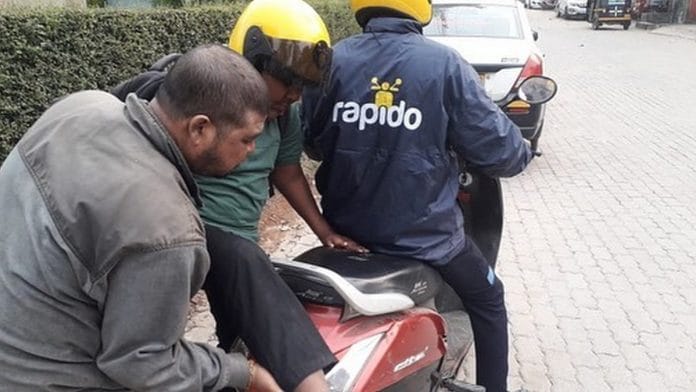New Delhi: Bike taxis, which were stopped from plying on Delhi roads in February this year, will soon be back in the city — legally this time.
Their comeback is part of the Delhi government’s ‘Draft Delhi Motor Vehicle Aggregator and Delivery Service Provider Scheme, 2023′, made public Wednesday, which is aimed at regulating taxi aggregators and delivery services in the national capital.
The Delhi transport department has put up the proposed policy on its website for public feedback for 30 days. The final policy will be notified after public feedback is factored in.
According to the draft, not only will bike taxis be brought back on the roads but the proposed policy also provides a timeline for all taxi aggregators — including those providing services through mobile apps — to adopt electric vehicles (EV).
The end goal, according to the draft, is to ensure all taxi fleets — two-, three- or four-wheelers — completely switch to electric vehicles by 1 April 2030.
While this switch will be gradual for three- and four-wheeler fleets, aggregators will have to ensure that the bike taxis they take on board are all EVs, the draft says. This will be applicable from the date of when the scheme commences.
The development comes months after the Delhi government put a complete stop on the use of bike taxis on city roads. Issuing a public notice late February, the Delhi transport department said that it had come across several instances of private vehicles being used for commercial purposes and that this was a violation of the Motor Vehicles Act, 1988.
Speaking about the new policy, Delhi Transport Commissioner Ashish Kundra told ThePrint that he was optimistic that the transition towards EVs will be “smooth and easy”.
“Last year, two-thirds of the goods three-wheelers registered in Delhi were electric, which is a large number. Simultaneously, 45 per cent of the taxis registered in the city were also electric,” he said.
But there are those who believe that simply legalising the operation of bike taxis doesn’t omit the safety risks involved.
“The more motorcycle use we introduce in our systems, the higher will be the risks,” Geetam Tiwari, professor of transportation research and injury prevention programme at IIT-Delhi, told ThePrint. “They pose a threat to pedestrians, and already a large number of people who die on roads are motorcycle riders. Enabling bike taxis is going to worsen the safety factor.”
Also Read: Electric cabs are taking over Delhi’s roads, with 15-fold surge in registrations in 5 years
Transition deadlines
The draft policy has different transition phases for three- and four-wheelers while having none at all for two-wheelers.
Aggregators will also have to ensure that 10 per cent of their three-wheeler taxi fleet and 5 per cent of their four-wheelers are converted to EVs within six months of the scheme being notified.
The policy will be applicable to aggregators, delivery service providers and e-commerce entities with a fleet of at least 25 motor vehicles.
Delhi Transport Commissioner Kundra said the government also plans to induct 1,500 more electric buses by November.
It currently has a fleet of 300 electric buses.
“We have additionally placed orders for over 4,000 electric buses. The goal is that 80 per cent of our bus fleet has to be electric by 2025,” Kundra said.
(Edited by Uttara Ramaswamy)






